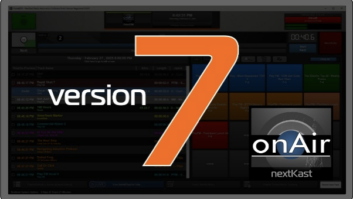WILMINGTON, Del. — Broadcasters’ hopes that a patent dispute would go away quickly — after last year’s favorable finding from a U.S. Patent and Trademark examiner — may have faded a bit now that the decision has been challenged.
PTO examiner Jason Proctor is considering amendments to patent claims submitted by Mission Abstract Data, the company that sued several broadcast owners in federal court in March 2011 over the hard-disk automation systems they use.

©U.S. Patent and Trademark Office
A federal judge issued a stay in the related patent infringement litigation until the patent claims are decided, as RW has reported. At least one patent attorney feels the USPTO has fast-tracked its reexamination in light of that federal patent infringement case.
Meanwhile, several Washington-based communications attorneys confirmed to Radio World that the company had sent another batch of collection letters to radio broadcasters in December asking them to sign licensing agreements.
Patent reexamination
The patents held by Mission Abstract Data describe a system and method for a programmable digital audio system for radio stations where the music is stored in a digital database from which it is recalled during radio station operation.
In October the examiner in large part dismissed the claims pertaining to radio broadcasters, specifically the “radio transmission of music retrieved from an online digital database stored in a hard drive.” The examiner overturned 15 of 29 challenged claims within the first patent and five of 10 claims in the second.
Radio automation supplier Broadcast Electronics, which is not a defendant in the patent infringement lawsuit, had requested the “ex-parte” patent reexamination. Ex-parte reexaminations are initiated by the public, according to the USPTO’s website. Since 1981, claims in such reexaminations were changed in 64 percent of the cases, according to the Patent Office.
In December, Mission Abstract Data responded to the findings of the reexamination. A company representative met with the examiner in person; MAD then amended some of the rejected claims for reconsideration while cancelling others that had been rejected, according to MAD documents filed last month with the USPTO.
Specifically, Claims 14 and 21 of Patent 5,809,246 were canceled because their subject matter was included in other amended claims, according to Mission Abstract Data. Its response addresses Claims 1 and 4 and changed them to “further specify that the computer system is connected to a local-area network and that the remote music source is accessed over a wide-area network.”
Claims 1 and 4 describe a music transmission system involving a computer memory storing a database comprising a plurality of music. The amendments appear to involve networking and how the music is retrieved, according to a patent attorney familiar with the latest developments.
The patent holder’s representative at the meeting is identified as Lawrence Aaronson, an attorney with Atlanta-based intellectual property law firm McKeon, Meunier, Carlin & Curfman. He provided background and briefly described the methods for operating the music transmission system claimed in the patents, according to MAD documents filed with the Patent Office.
The amendments are meant “to show the claims are different from the way in which the examining attorney viewed them to be too similar to the prior art,” said Kevin Goldberg, communications attorney at law firm Fletcher Heald. He is not associated with the case.
The MAD report to the USPTO, obtained by RW, included a summary of the meeting between Aaronson and the patent examiner, including the examiner’s initial reactions to the arguments.
Aaronson argued that a 1992 Arrakis Digilink operators manual and 1993 Dalet advertisement that appeared in Radio World, which had been presented as “prior art” evidence, fail to suggest a “RAID disk array storage” as indicated in the amended Claim 4.
“Nowhere does the Digilink Ops Manual teach or suggest connecting the nodes or the Digilink network to a wide-area network,” according to Aaronson, quoted in the USPTO document. “As such, the reference fails to teach or suggest accessing remote music source over a wide-area network.”
The MAD summary document submitted to the USPTO also indicated, “The Reexamination Panel tentatively agreed that such an amendment [Claim Number 4] would distinguish over the applied prior art and indicated they would consider the amendment.”
Goldberg said, “I think it is significant that one statement made in the interview summary makes it seem as though the examiner agreed that an amendment” of Claim Numbers 1 and 4 “might result in a different outcome.”
Just one bite?
Bill Ragland, a patent attorney with Womble Carlyle Sandridge & Rice who is not involved in the suit, said these amendments are critical to Mission Abstract Data’s attempts to reverse the examiner’s decisions.
“This is a normal part of the process. The patent holder is responding to the arguments of the examiner trying to change his mind. Then [the examiner] must decide whether the patent holder’s amendments support the request to overcome the initial rejection and the prior art,” Ragland said.
The patent rights-holder is allowed a second response in an ex-parte reexamination should the examiner again reject some of the claims, he said; but the patent owner typically has a more difficult time overcoming the limitations.
“You usually only get one bite of the reexamination apple. You can respond again, but with fewer amendments. The patentee also can try to negotiate changes with the [PTO] examiner,” he said.
Ragland acknowledged the swiftness at which the Mission Abstract Data patent review is progressing. “My supposition is that someone in the patent office has determined that this case deserves to go to the front of the line and needs to be decided because of the litigation.”
The patent owner ultimately may appeal the examiner’s rejections to the Patent and Trademark Board of Appeals, according to Ragland.
Meanwhile, Mission Abstract Data, which also does business as DigiMedia, continued to send letters to radio broadcasters claiming the radio station owes them licensing fees for use of the patent.
The National Association of Broadcasters is urging members who receive the letters to consider several options including seeking legal advice and contacting their automation system supplier for guidance, according to its December electronic publication “The NAB Pulse.”
NAB also suggests that broadcasters ask their insurance carriers whether those companies provide coverage for such a case.
Repeated attempts by Radio World to reach Mission Abstract Data representatives have been unsuccessful. The broadcasters involved in the ongoing litigation have also declined comment.
Background
Several radio groups were plunged into the unknown when Mission Abstract Data filed the lawsuit in U.S. District Court for the District of Delaware in March 2011, alleging patent infringement by broadcast groups, including CBS Radio, Beasley Broadcasting, Cox Radio, Greater Media and Cumulus.
There has been intrigue over those who are associated with the plaintiff. RW previously confirmed that at one time patent holding company Intellectual Ventures owned MAD. Former Microsoft Chief Technology Officer Nathan Myhrvold founded IV in 2000.
Intellectual Ventures owned Mission Abstract Data when MAD acquired the two patents in question in 2007 from Haltek America Inc., according to an assignment history from the U.S. Patent and Trademark Office. Others listed in the assignment history as holders of the patents through the years include IM Networks (formerly Sonicbox Inc.), Concert Technology Corp. and Hahek America, though the latter appears to have been a typo for Haltek, subsequently corrected in the patent records.
The inventor named on the patents, Robert Goldman, apparently was an executive with Haltek at one time.
Bloggers on sites such as TechCrunch.com have disparaged Intellectual Ventures, the IP licensing company, as a “patent troll” that they say exists mainly to extract patent-licensing fees from other companies and whole industries. Intellectual Ventures told Radio World in 2011 that it no longer owns the patents.
United States District Judge Leonard P. Stark granted a stay in the hard-disk automation patent suit in November, effectively placing on hold the legal case as Mission Abstract Data and the defendants work through the reexamination process.







